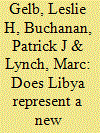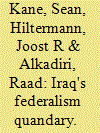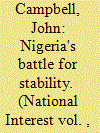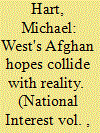|
|
|
Sort Order |
|
|
|
Items / Page
|
|
|
|
|
|
|
| Srl | Item |
| 1 |
ID:
110320


|
|
|
|
|
| Publication |
2012.
|
| Summary/Abstract |
In the last issue of The National Interest, we ran a cover story by Nikolas K. Gvosdev and Ray Takeyh positing that America's military role in helping bring down Libyan president Muammar el-Qaddafi represented a significant new era in the country's foreign policy-the ascendancy of a doctrine that placed far greater emphasis on humanitarian considerations as a rationale for military interventions overseas. This was a provocative thesis, and the authors' probing analysis and tight argumentation rendered it one that we were proud to display prominently in our journal. But it occurred to us that it certainly didn't represent the last word on the subject of the future of American foreign policy. And so we invited three prominent international-relations thinkers-Leslie H. Gelb, Patrick J. Buchanan and Marc Lynch-to weigh in with their own thoughts on the subject. Their musings follow, along with a final response from Gvosdev and Takeyh, who get the last word as a reward for introducing the subject in the first place.
|
|
|
|
|
|
|
|
|
|
|
|
|
|
|
|
| 2 |
ID:
110316


|
|
|
|
|
| Publication |
2012.
|
| Summary/Abstract |
OF ALL the U.S. presidents since Franklin Roosevelt, none stands taller in history or exercises a greater lingering influence on American politics than Ronald Reagan. Republican politicians invoke his name as example and lodestar, and Democrats have granted him increasing respect as the passions of his presidential years have ebbed with time. Surveys of academics on presidential performance, initially dismissive, now rank him among the best of the White House breed. Even President Obama has extolled his approach to presidential leadership.
|
|
|
|
|
|
|
|
|
|
|
|
|
|
|
|
| 3 |
ID:
110318


|
|
|
|
|
| Publication |
2012.
|
| Summary/Abstract |
WITH U.S. combat troops out of Iraq and that country facing an uncertain future, many challenges hover over the lands of old Mesopotamia. The most ominous is the unsettled struggle over power, territory and resources among the country's political elites. While often described in straightforward ethnic and sectarian terms, this strife has gone through many phases. Various alliances have come together and broken apart as the power struggle has shifted from a sectarian street war to heightened tensions between Baghdad and the Kurdistan Regional Government (KRG) in Erbil. Most recently, the main axis of confrontation has been between Prime Minister Nouri al-Maliki's Shia-led government and its putative governing partner, the mostly Sunni Iraqiya list.
|
|
|
|
|
|
|
|
|
|
|
|
|
|
|
|
| 4 |
ID:
110319


|
|
|
|
|
| Publication |
2012.
|
| Summary/Abstract |
RECENT EVENTS in Nigeria, including its presidential elections last April, have produced two narratives on the current state of that oil-rich West African nation with a history of civic turmoil. The first is that events there have unfolded rather favorably since its elected president, Umaru Yar'Adua, fell ill in late 2009 and the country was left leaderless. That raised fears of a military coup, but then Goodluck Jonathan emerged to fill the power vacuum, first as an extraconstitutional "acting president," then as a constitutional successor after Yar'Adua's death and finally as the elected executive following the 2011 elections. This optimistic narrative notes that those elections were praised by international observers as better than in the past-and hence they reflected the will of the national majority. An amnesty for militants in the oil-rich Niger Delta, combined with disarmament, training and reintegration, ended a long insurrection there. One serious specter, however, still haunts the country-the expansion of the Islamic "terrorist group" Boko Haram, with its global connections. Hence, Nigeria's security challenge has become internationalized, and Westerners grappling with Islamist movements need to keep a sharp eye on that situation.
|
|
|
|
|
|
|
|
|
|
|
|
|
|
|
|
| 5 |
ID:
110317


|
|
|
|
|
| Publication |
2012.
|
| Summary/Abstract |
THE WEST'S military engagement in Afghanistan is entering its eleventh year and has another two years to go before the end of combat operations in 2014. Whatever the result of the international conferences that began last year in Istanbul and Bonn to elicit support for a successor state, one thing is clear: after Western forces draw down, Afghanistan won't bear much resemblance to the Western vision that fueled the intervention in the first place.However effective Western military organizations are in transitioning to Afghan control, the country's future will not be decided primarily by the residual structures and legacies of Western involvement, the current Taliban insurgency or even any formal process of reconciliation. Rather, it will be decided more by the country's ethnic character, the particular nature of local and national governance, and the influence of neighboring powers with enduring geopolitical and strategic imperatives in the region far stronger than those of the West.
|
|
|
|
|
|
|
|
|
|
|
|
|
|
|
|
|
|
|
|
|